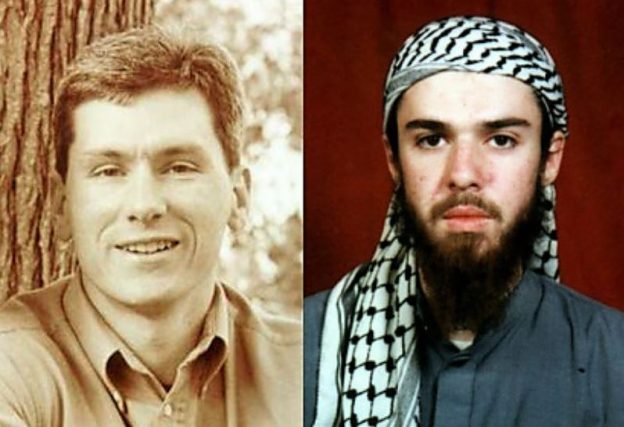There’s a reason the American Constitution emphasizes “the right of trial by jury.” The justice system’s mandate is to unveil the truth. This can only be done in a court of law, and in accordance with due process. The plea bargain is nothing more than a negotiated deal which subverts the very goal of the justice system: In the process of hammering out an agreement that pacifies both prosecution and defense, truth usually falls by the way. As the predominant method of adjudication in the United States, the plea bargain taints the system.
The outcome of the wheeling and dealing in the case of John Walker Lindh, aka Suleyman al-Faris, aka Abdul Hamid, was that the American Taliban agreed to plead guilty only to supplying services to the Taliban, as well as to carrying an explosive during the commission of a felony, both in violation of the United States Code. The plea is peanuts compared to the original indictment.
There’s no doubt that closing such a high-profile case without having to present a jury or judge with evidence and witnesses, and, in turn, without allowing the defendant to present his case, is a sweet victory for any politically ambitious prosecutor. No surprise then that U.S. Attorney Paul McNulty counted the deal as a triumph against terrorism.
For his part, Lindh’s defense attorney bizarrely claimed for himself the feat of having his client certified as a “court approved, non-terrorist.” Both advocates are capitalizing on the perks of the plea bargain. Defense attorney and prosecutor alike can pencil in a victory on their scorecards. This, in the absence of the arduous search for truth and without any regard for the original indictments.
The overwhelming power of the state compared to the limited resources and power of the accused means that ordinarily the accused is the compromised party in a plea. This truism is hard to sustain in the Lindh case, if one endeavors to come to grips with the facts of the case.
Suffice it to say that Johnny Walker Lindh’s Islamic conversion was nowhere near as harmonious as that of Yusuf Islam. The lyricist formerly known as Cat Stevens confines himself to composing “A’s For Allah” devotional singalongs.
Understandably, the family of CIA agent Johnny Michael Spann is piqued. According to the Criminal Complaint, Spann conducted the interviews at the Qala-i Janghi compound near Mazar-e Sharif, in Afghanistan. Lindh was among the Taliban and al-Qaida men captured and brought there by Northern Alliance forces. “Some of the brothers were very tense,” Lindh related to journalist Robert Young Pelton. “We’re going to die either way,” they reasoned. According to Lindh, “the brothers” decided to aim for the virgin-strewn heavens.
To Lindh and “the brothers” at Mazar-e Sharif dying in the course of an uprising meant martyrdom. For Mike Spann it meant murder. The CIA officer was consequently beaten and shot.
Lindh belonged to the Arab section of Ansar, which was a sort of foreign legion affiliated to the Taliban army. It was also part of Osama bin Laden’s al-Qaida group. Lindh confessed to having trained at the al-Qaida-run al Farooq base, where, aside from having a brief audience with OBL, he also practiced terrorism warfare. When rumors about bin Laden’s sending “50 people to carry out 20 suicide operations” against the U.S and Israel reached a crescendo in the camp, Lindh cowered. He failed to warn anyone back home.
By his own earlier account, Lindh appeared to be in on the Mazar-e Sharif uprising plot. As one of the prisoners interviewed by Spann, Lindh refused to answer any of Mr. Spann’s questions, much less did he offer him a “Hey man, watch out, and may Allah be with you.”
Is Lindh guilty of conspiring to murder Mike Spann? Lindh certainly failed to warn the victim. Because of the Bush administration’s criminal negligence of the intelligence, a message from Lindh warning about the impending September 11 terrorist attacks would have been to no avail. Had he, however, done that meager thing and warned Mike Spann, Lindh would have discharged his moral duty. As it stands now, this pattern of moral rot has been rendered legally legless.
The questions, nonetheless, linger. In his Statement to the Court, Lindh correctly points out that the U.S. hadn’t always proscribed fighting alongside what were once the Mujahideen. On the contrary, the U.S. supported the Taliban’s predecessors in their fight to repel the Soviets. Yet another effect of this plea bargain is to further hush the irreconcilable implications of U.S. meddlesome foreign policy.
Still, the facts indicate that, in the process of negotiating into being a crime that was palatable to all parties, Lindh was let off lightly.
©By ILANA MERCER
WorldNetDaily.com
October 9, 2002
CATEGORIES: Crime, Criminal injustice, Democracy, Foreign Policy, Islam, Law, Terrorism

 print
print